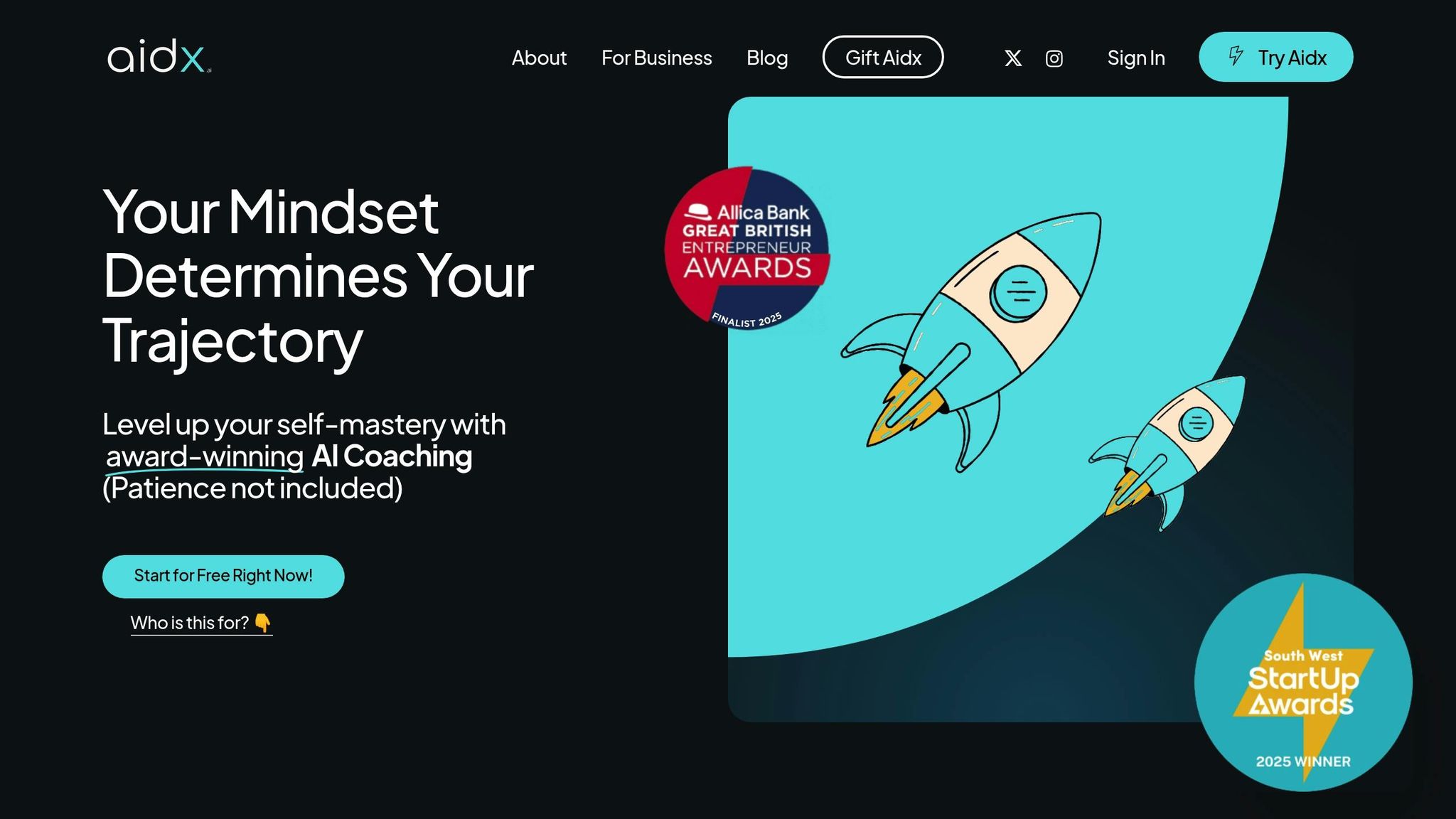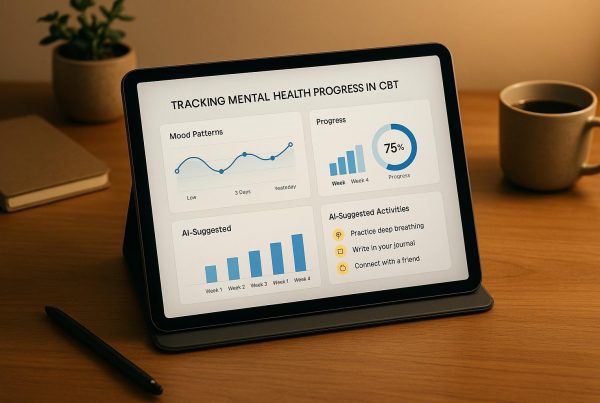Building mental resilience starts with small, consistent daily habits. These habits help you manage stress, recover from challenges, and maintain emotional balance. Here’s a quick summary of effective strategies:
- Journaling & Gratitude: Write down 3 things you’re grateful for, set a daily intention, and reflect on lessons learned.
- Positive Self-Talk: Reframe negative thoughts and label emotions to reduce their intensity.
- Mindfulness & Meditation: Spend 10–15 minutes daily on breathing exercises or short meditations.
- Physical Health: Prioritize 7–9 hours of sleep, regular exercise (like a 30-minute walk), and balanced meals.
- Set Small Goals: Break goals into manageable steps and celebrate small wins to stay motivated.
These habits not only improve emotional well-being but also create a mindset that views setbacks as learning opportunities. Tools like Aidx.ai can provide personalized guidance, helping you stay consistent with your habits and track progress effectively.
How to Build a Resilient Mind with Daily Self-Care (Backed by Science)
Daily Habits That Build Mental Resilience
Strengthening mental resilience doesn’t require grand gestures. Instead, it’s about weaving small, intentional habits into your daily life. These practices can help you manage stress and build a solid emotional foundation.
Start Your Day with Journaling and Gratitude
A few minutes of journaling in the morning can shape your mindset for the day ahead. Try this simple approach: jot down three things you’re grateful for, set one intention for the day, and write an affirmation that reinforces your confidence. Adding an evening reflection – such as noting the best part of your day or a lesson you learned – can make this habit even more impactful. It’s not about writing pages; even a few sentences each day can shift your perspective over time.
Practice Positive Self-Talk and Reframe Negative Thoughts
The way you talk to yourself matters. When negative thoughts arise, challenge them with a more balanced perspective. For instance, instead of thinking, "I always mess up", reframe it as, "I’ve overcome challenges before and learned from them." Another helpful strategy is labeling your emotions. Simply naming what you’re feeling – like saying, "I’m anxious about this presentation" – can create a sense of distance from the emotion, making it feel less overwhelming[3]. Combine this with affirmations that feel realistic and supportive to nurture a more constructive inner dialogue.
Use Mindfulness and Meditation Daily
Mindfulness doesn’t have to mean sitting cross-legged for hours. Just 10–15 minutes a day can make a difference in reducing stress and improving focus[6]. Start small: take three deep breaths when you wake up, pause for a one-minute mindful break during work, or wind down with a brief meditation before bed. The goal isn’t perfection – it’s gently bringing your attention back to the present moment whenever it wanders.
Connect Physical Health to Mental Strength
Your physical health and mental resilience are deeply connected. Aim for 7–9 hours of sleep, regular physical activity, and balanced meals to support your emotional well-being. Even 30 minutes of moderate exercise – like walking, yoga, or dancing – can lift your mood by releasing endorphins[2]. A consistent sleep routine and nourishing foods give your body the energy it needs to handle daily stressors more effectively.
Set Small Goals and Build New Habits Gradually
Big changes start with small steps. Break larger goals into manageable daily actions. For instance, you could pair a new habit with an existing routine – like practicing gratitude while sipping your morning coffee or doing a quick breathing exercise before starting your workday. Keep track of your progress with a journal or simple notes, and celebrate small victories along the way. These little wins add up, making the process of building resilience feel both achievable and rewarding.
How Daily Habits Create a Growth Mindset
The habits you practice every day have a profound impact on your brain. They create new neural pathways that improve learning, emotional regulation, and the ability to adapt to challenges over time[3]. These habits lay the groundwork for a growth mindset, the belief that your abilities and intelligence can grow through effort and learning. By consistently engaging in these practices, you create a mental framework that supports resilience and progress.
Simple actions like journaling, celebrating small wins, or taking mindful pauses reinforce positive thought patterns. They help you see challenges as opportunities rather than obstacles. Studies reveal that habits like practicing gratitude and mindfulness can rewire your brain to focus on the positive, leading to reduced stress and greater emotional well-being[7]. Tracking progress and acknowledging victories, no matter how small, strengthens this mindset, making it easier to stay motivated.
Turn Setbacks into Learning Opportunities
Daily habits also reshape how you handle setbacks. When you reflect on challenges, you shift your perspective on failure. Instead of seeing it as a dead end, you start to view it as feedback – valuable information that helps you adjust and move forward. This change doesn’t happen overnight; it’s the result of consistent reflection on what went wrong and what lessons can be drawn from tough experiences[2][4].
For instance, after encountering a setback, ask yourself questions like "What can I learn from this?" or "How might I approach this differently next time?" By making this kind of reflection a regular habit, you train your brain to focus on solutions instead of dwelling on negative emotions[2][5].
Cognitive-behavioral strategies support this approach by encouraging you to reframe setbacks as temporary and specific. For example, after a difficult day at work, instead of thinking, "I’m bad at my job", you might write in a journal: "The presentation didn’t go as planned. I realized I need more practice, so next time I’ll prepare differently." This kind of reframing builds resilience and emotional flexibility.
Track and Celebrate Small Wins
Acknowledging even small steps forward can make a big difference. Celebrating progress activates reward pathways in the brain, reinforcing positive habits and boosting your confidence in overcoming future challenges[5]. The simple act of tracking your achievements shows you that your efforts are making a difference.
Celebrations don’t need to be extravagant. Writing down that you completed a quick meditation, took a walk during a break, or successfully shifted your perspective on a stressful situation counts as progress. These small moments of recognition fuel your confidence and encourage you to keep going[2]. Over time, tracking your progress becomes a habit that strengthens your belief in your ability to improve.
Use Regular Self-Reflection for Continued Growth
Building on your daily habits, regular self-reflection helps you stay on course and refine your approach. Weekly or monthly check-ins allow you to evaluate what’s working, identify areas for improvement, and track how your mindset is evolving[4]. This structured reflection fosters self-awareness and adaptability, both of which are essential for maintaining a growth mindset[8].
Self-reflection goes beyond casually thinking about your day. It involves asking targeted questions to uncover patterns in your behavior. For example, you might ask: "Which habits have improved my resilience the most?" or "What recurring challenges could I prepare for better?" These questions help you gain clarity and address blind spots in your personal growth[1].
The goal is to continuously refine your approach. By regularly assessing your progress and making adjustments, you can build on what’s working and address what’s not. Over time, this process ensures that the lessons from your daily habits lead to meaningful and lasting change[1].
Purposeful self-reflection ties all your resilience practices together into a cohesive system. It transforms individual habits into a powerful strategy for growth, helping you become more adaptable and mentally strong as you move forward.
sbb-itb-d5e73b4
Using Aidx.ai to Build Resilience and Form Better Habits

Building resilience and forming better habits takes more than just good intentions – it requires consistent effort and the right tools. Aidx.ai, a two-time winner of the UK Startup Awards, offers AI-powered coaching designed to help you create lasting habits using proven therapeutic techniques. With a personalized approach, it focuses on understanding your unique patterns and providing support tailored to your needs.
Aidx.ai combines professional therapeutic methods with practical tools, helping you turn insights into meaningful behavioral changes. This approach strengthens mental resilience and lays the groundwork for sustainable habit formation.
Get Personalized Daily Habit Coaching with Aidx.ai
At the heart of Aidx.ai is its Adaptive Therapeutic Intelligence (ATI) System™, which learns your habits and preferences to deliver customized coaching. For example, if mindfulness resonates with you but staying consistent is a challenge, the system might suggest short, guided breathing exercises in the morning and send reminders at times when you’re most likely to engage.
The coaching is rooted in evidence-based techniques like Cognitive Behavioral Therapy (CBT), Acceptance and Commitment Therapy (ACT), Dialectical Behavior Therapy (DBT), and Neuro-Linguistic Programming (NLP). This ensures that the guidance you receive isn’t just motivational – it’s grounded in methods proven to support long-term resilience.
"The Aidx Adaptive Therapeutic Intelligence (ATI) at its core is built to track your patterns over time and keep iterating until it gets you actual results."
- Aidx.ai
Let’s say you’re trying to build a gratitude practice. Aidx.ai can prompt you each evening to write down three things you’re grateful for, ask reflective questions based on your entries, and track your progress. The system adapts its prompts based on your feedback, offering encouragement and highlighting improvements to reinforce the habit through positive reinforcement.
What makes it even more convenient is the voice-enabled interface, allowing you to engage with your habits through natural conversation – no need to be glued to a screen.
Stay Consistent with Built-in Planning and Tracking
Consistency is key when it comes to forming habits, and Aidx.ai helps you stay on track with its integrated planning and tracking tools. The platform includes a built-in planner where you can set goals, monitor habit completion, and track metrics like mood, stress levels, and confidence over time.
Custom notifications and reminders are tailored to your engagement patterns, ensuring you receive prompts when they’re most effective. These tools bridge the gap between insights and action, helping you turn intentions into results.
"What happens after your insights is equally important. That’s why Aidx integrates a practical planner and customizable notification system, ensuring your breakthroughs translate into lasting change through actionable steps delivered via your preferred channel."
- Aidx.ai
Aidx.ai also offers emotional tracking features, allowing you to log your mood, stress, and confidence levels daily. By analyzing these patterns, the system identifies triggers, suggests coping strategies, and adjusts habit recommendations to better suit your needs. This kind of self-monitoring boosts self-awareness – a critical element of resilience – and gives you a clear view of your progress.
If you hit a rough patch or feel unmotivated, Aidx.ai steps in with supportive check-ins. It helps reframe negative thoughts using CBT techniques and suggests smaller, manageable habits to help you regain momentum. By highlighting your past successes and adjusting goals to be more achievable, the platform keeps you moving forward, even during challenging times.
Access Professional Techniques Anytime
One of the standout features of Aidx.ai is its 24/7 access to professional therapeutic techniques. Whether you need help reframing negative thoughts, practicing mindfulness, or managing stress during a tough moment, the platform delivers real-time exercises tailored to your situation. These tools directly support the habit-building process, making it easier to stay resilient throughout your day.
For example, you might use cognitive reframing after a setback, mindfulness meditations during a break, or emotion labeling to better understand your feelings. The platform’s privacy-first design ensures all your interactions are fully encrypted and GDPR-compliant, with an optional incognito mode for added confidentiality. This allows you to engage openly with sensitive topics, knowing your information is secure.
Aidx.ai is available via web and app interfaces, offering specialized modes for different needs: Life Mode for personal growth, Business Mode for workplace challenges, and Performance Mode for optimizing peak performance. Whether you’re focusing on personal resilience or professional stress management, Aidx.ai provides tailored support to meet your goals.
Conclusion: Start Small and Stay Consistent
Building mental resilience isn’t about dramatic, overnight changes – it’s about taking small, steady steps every day. Studies reveal that simple practices like expressing gratitude can lower stress and improve emotional well-being[7]. Similarly, regular physical activity not only enhances your mood but also supports overall health. Actions like keeping a gratitude journal, taking short walks, or practicing deep breathing may seem minor, but over time, they help your brain develop new pathways to better handle stress.
The key here is consistency. Small habits, repeated daily, create routines that require little effort yet deliver lasting benefits. Even dedicating just 15 minutes a day to mindfulness or relaxation exercises can sharpen focus, reduce fatigue, and ease feelings of anger[6].
You might notice positive changes within weeks of sticking to these habits. Celebrate those small victories – they reinforce your progress and motivate you to keep going. By weaving these simple practices into your life, you create a strong foundation for building mental resilience.
For those looking for extra guidance, Aidx.ai offers tools like its Adaptive Therapeutic Intelligence (ATI) System™. With personalized support and integrated planning, it helps turn good intentions into consistent actions, complementing your daily habits and strengthening your resilient mindset.
FAQs
What are some easy ways to start practicing mindfulness and meditation daily, especially for beginners?
Starting mindfulness and meditation is easier than you might think and can bring a sense of calm to your daily life. To get started, carve out just 5–10 minutes each day in a quiet spot where you won’t be disturbed. Sit in a position that feels comfortable, close your eyes, and focus on your breath. Take a deep inhale through your nose, hold it briefly, and then exhale slowly. If your thoughts start to drift, gently guide your attention back to your breathing – no need to criticize yourself for getting distracted.
If you’re unsure where to begin, guided meditations or mindfulness apps can be a great help. As you get more comfortable, you can gradually extend your practice and even weave mindfulness into your daily routines. Whether it’s savoring your meals, taking mindful steps during a walk, or simply noticing the world around you, the practice can grow with you. The most important part? Stick with it and give yourself grace as you build this habit.
How can I stay consistent with daily habits that build mental resilience?
Sticking to habits that boost mental resilience doesn’t have to feel overwhelming. Start small and build up gradually. For instance, you might begin with just a few minutes of mindfulness each day or spend a little time journaling your thoughts in the evening. These small steps can eventually turn into regular parts of your daily routine.
Accountability can make a big difference, too. Set reminders, use habit-tracking apps, or share your goals with someone you trust to help you stay consistent. Remember, it’s about making progress, not being perfect. If you miss a day, don’t sweat it – just pick up where you left off. Resilience is a journey, and even the smallest steps forward matter.
How does Aidx.ai tailor daily habit coaching to fit individual needs?
Aidx.ai uses its Adaptive Therapeutic Intelligence (ATI) System™ to offer coaching that grows and changes alongside you. By studying your communication habits, emotional tendencies, and personal preferences, it provides support specifically designed to match your individual needs.
The system continuously learns and adjusts, making sure the guidance you get becomes more aligned with your goals over time, helping you strengthen your mental resilience and develop personally.



